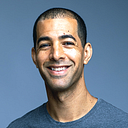1 min readApr 9, 2018
Thanks for talking the time to give a thought out reply. A few thoughts:
- I’d argue that in the age of artificial narrow intelligence that we’re currently in, one of the things we can uniquely do is bridge between different types of datasets, something AI can’t do. For example, when you think of many of the greatest breakthroughs in science, many of them are the result of creative leaps between two ideas that a computer could never make with today’s algorithms.
- What is the connection between IQ and being a polymath in your mind? I didn’t get that in your response. I don’t see the connection. Are you making the case that in order to see connections between things we need to have a high IQ?
- I don’t deny that there is and will be skill gaps in specific areas of expertise. In the article, I’m not making that case that specialization is bad. I’m making the case that in domains measured by creativity of the output rather than quantity of output, learning across domains in order to have a creative breakthrough in your core area of specialty is the best approach. I’m making the case for diversity in learning and specialization in application.
- One observation is that many people use the word polymath to mean a lot of different things. When you say “true polymath” that implies a single definition. Based on your implied definition, I certainly agree with you that there are very few people who have made significant creative breakthroughs in multiple domains.
